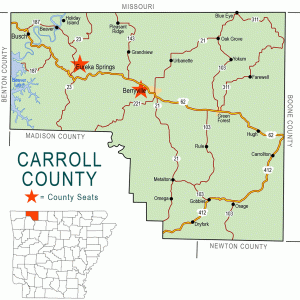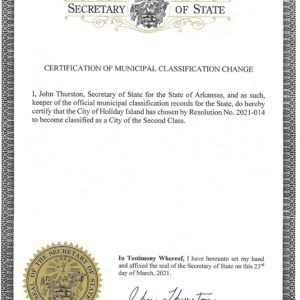calsfoundation@cals.org
Holiday Island (Carroll County)
| Latitude and Longitude: | 36º29’07″N 093º43’56″W |
| Elevation: | 1,411 feet |
| Area: | 10.77 square miles (2020 Census) |
| Population: | 2,533 (2020 Census) |
| Incorporation Date: | December 3, 2020 |
Historical Population as per the U.S. Census:
|
1810 |
1820 |
1830 |
1840 |
1850 |
1860 |
1870 |
1880 |
1890 |
1900 |
|
– |
– |
– |
– |
– |
– |
– |
– |
– |
– |
|
1910 |
1920 |
1930 |
1940 |
1950 |
1960 |
1970 |
1980 |
1990 |
2000 |
|
– |
– |
– |
– |
– |
– |
– |
– |
– |
– |
|
2010 |
2020 |
|
|
|
|
|
|
|
|
|
2,373 |
2,533 |
|
|
|
|
|
|
|
Holiday Island is a planned community in northwestern Carroll County, a few miles north of Eureka Springs (Carroll County) near the Missouri state line. Located along a portion of Table Rock Lake, which is part of the White River, Holiday Island consists of roughly 4,800 acres and has a population of more than 2,500. Holiday Island citizens approved incorporating Holiday Island as a town on November 3, 2020, and it officially became a second-class city on March 23, 2021.
Northern Arkansas was long considered the hunting land of the Osage, who lived to the north in what is now Missouri. By 1825, the Osage had been removed west to what is now Oklahoma, and settlers began attempting to farm the forested rocky slopes of the Ozark Mountains. Hugh Bandy acquired land along the White River at the state line in 1861; the area was generally known as Bandy’s Bend. With the development of Eureka Springs late in the nineteenth century, more people began to explore the remoter parts of Carroll County. Reportedly, a man named Banach purchased land near the White River and built a house that included facilities for his employees to use as a vacation spot.
The U.S. Congress approved funding for dams on the White River in Arkansas and Missouri in 1941, but World War II and then other projects following the war delayed construction of Table Rock Dam until the 1950s. Construction of the dam began in 1954, and the lake—most of which is in Missouri—was completed by 1958. Electricity is generated by water moving through the dam, and the lake is known for providing fishing, boating, and other recreational activities. Tourism became the primary industry of the area, and developers began looking for land to purchase.
Robert McColloch (who is most famous for purchasing the London Bridge, dismantling it, and reassembling it in Arizona) was the principal developer of Holiday Island. Lemuel H. Tull, Lee R. Reddick, and August Damon applied for the formation of the Holiday Island Suburban Improvement District and were named commissioners of the district in July 1970. Two newspapers were created in the community: the Holiday Islander, which began publishing in 1984, and the Holiday Island Regional News, which began in 1996. The Islander was sold and ceased publishing around 1998.
The developers donated one acre of land to Grace Lutheran Church, which was formed in 1972 by twenty-six Lutherans. A Presbyterian church was formed in Holiday Island in the 1990s. There are also two Baptist churches and a community church. In addition to building homes with city-type sewers, the developers created two golf courses, a marina, a shopping center with more than forty businesses and services, and a recreation center. The area also has two assisted-living facilities, a campground, a fitness center with rehabilitation services, a medical clinic, an eye doctor, and a dentist. Holiday Island is served by the Carroll County Sheriff’s Department. The local fire department has three stations. Organizations exist for various interests, such as golf, bridge, theatre, photography, art, tennis, hiking, quilting, and gardening. Buses transport children to nearby Eureka Springs schools.
For additional information:
City of Holiday Island. www.cityofholidayisland.com (accessed May 2, 2023).
The History and Families of Carroll County, Arkansas. Paducah, KY: Turner Publishing Company, 2003.
Holiday Island Suburban Improvement District. http://holidayisland.us/ (accessed May 2, 2023).
Lair, Jim. An Outlander’s History of Carroll County, Arkansas, 1830–1983. Marceline, MO: Walsworth Publishing Company, 1983.
Visit Holiday Island, Arkansas. https://www.visitholidayisland.com/ (accessed May 2, 2023).
Steven Teske
Butler Center for Arkansas Studies
 Carroll County Map
Carroll County Map  Holiday Island Certificate
Holiday Island Certificate 




Comments
No comments on this entry yet.